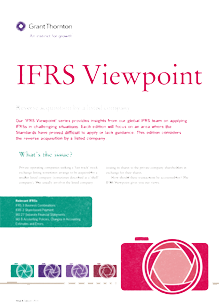Private operating companies seeking a 'fast track' stock exchange listing sometimes arrange to be acquired by a smaller listed company (sometimes described as a 'shell' company). This usually involves the listed company issuing its shares to the private company shareholders in exchange for their shares.
How should these transactions be accounted for? The IFRS Viewpoint gives you our views.
Our view
A transaction in which a company with substantial operations ('operating company') arranges to be acquired by a listed shell company should be analysed to determine if it is a business combination within the scope of IFRS 3.
Is the transaction a business combination?
Answering this question involves determining:
- which company is the 'accounting acquirer' under IFRS 3, ie the company that obtains effective control over the other
- whether or not the acquired company (ie the 'accounting acquiree' under IFRS 3) is a business.
In these transactions, the pre-combination shareholders of the operating company typically obtain a majority (controlling) interest, with the pre-combination shareholders of the listed shell company retaining a minority (non-controlling) interest. This usually indicates that the operating company is the accounting acquirer.
If the listed company is the accounting acquiree, the next step is to determine whether it is a 'business' as defined in IFRS 3. In our view, the listed company is not a business if its activities are limited to managing cash balances and filing obligations. Further analysis will be needed if the listed company undertakes other activities and holds other assets and liabilities. Determining whether the listed company is a business in these more complex situations typically requires judgement.
An acquisition in which an operating company obtains effective control over a listed company that is not a business is not a business combination. It is therefore outside the scope of IFRS 3.
Accounting when the transaction is not a business combination
Although a reverse acquisition of a 'non-business' listed company is not a business combination, the listed company becomes a legal parent and continues to have filing obligations. Accordingly, IFRS 10 requires it to prepare consolidated financial statements. In our view, these consolidated financial statements should be prepared using reverse acquisition methodology, but without recognising goodwill.
Accounting when the transaction is a business combination
When the listed company is the accounting acquiree and is also a business for IFRS 3 purposes, IFRS 3's reverse acquisition approach applies in full. Goodwill is then recognised to the extent the deemed acquisition cost exceeds the fair value of the listed company's identifiable assets and liabilities. Although some of the deemed acquisition cost might in substance relate to the cost of obtaining a listing, this amount is subsumed into goodwill.
When the listed company is identified as the accounting acquirer, the normal IFRS 3 acquisition accounting principles apply.
Read full report


